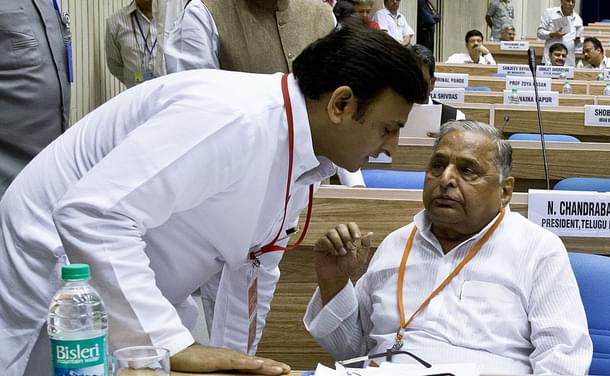Politics
Akhilesh’s Coup Against Mulayam: An Unprecedented Political Patricide
Vikas Saraswat
Jan 21, 2017, 06:28 PM | Updated 06:28 PM IST
Save & read from anywhere!
Bookmark stories for easy access on any device or the Swarajya app.


In his brilliant psychoanalysis, The Death and Afterlife of Mahatma Gandhi, Professor Makarand Paranjape ruminates the reluctance of Indian society to dwell on Nathuram Godse's killing of Mahatma Gandhi because it is akin to patricide -- something Godse himself admits in the court proceedings, albeit obliquely. The theme of Paranjape's book, which revolves around this figurative patricide, expounds the significance of the act for modern India as a break from Hindu traditions of yore, and the shock which wouldn't allow Indians, Congressmen included, to own up to the reality of it.
Much of the disbelief and conspiracy-mongering around Akhilesh Yadav's coup against his father Mulayam stems from similar sentiments. In our dynasty-ridden politics, where doting fathers and mothers have been occupied with promoting their sons and daughters, an internecine filial feud comes as a shocker. It is, however, undeniable that by rendering Mulayam as the "margdarshak" and divesting him of real powers, Akhilesh has executed the first political patricide in Indian politics.
There have been difficult relations within Indian political families in the past. Some of them, like Indira-Sanjay relations, were the talk of the town for their ugly spats. Others like Rajmata-Madhavrao fell into ideologically-differing camps and entered litigation over family properties. Yet others like Farooq and Omar Abdullah ensured the bickering didn't become public. But the Mulayam-Akhilesh feud is uniquely different because the latter has not only usurped the party but also finished the former's political career.
Just as with Godse's killing of Gandhi, which Paranjape rightly calls "India's traumatic tryst with both the nation and with modernity", this political patricide by Akhilesh signals a radical departure from Hindu societal values in politics. That Mulayam himself hasn't been able to garner much sympathy in the turn of events is despite the act and because of his own unscrupulous past. From Ram Manohar Lohia to Chaudhary Charan Singh and V P Singh to Chandrashekhar, Mulayam has betrayed all his mentors and patrons.
Socialism, by which Mulayam swore all his life, couldn't have been exposed better for its farce by the images of Lamborghini, belonging to second son Prateek Yadav, splashed all over media. And it isn't Prateek alone who flaunts his lavish lifestyle; Mulayam and Akhilesh themselves move around in Mercedez models costing upwards of Rs 2.5 crore.
The real beneficiaries of Mulayam's socialist model, like most of his compatriots in other parts of India, have been brothers, sons, daughters-in-law, nephews and sundry relatives. The motley crowd of vested interests who joined Mulayam in the course of his political journey sensing future opportunities, deserted him swiftly in favour of Yadav junior. Those partymen hailing Akhilesh as the saviour and gunning for Mulayam and Shivpal are the same people who, till recently, wouldn't tire eulogising "Netaji" and "Chachaji".
The pursuit of ideology-devoid politics and contraction of party affairs into one family are the reasons which led to the intrigues and finally the coup. Not without good reason, the coup has been likened by some to Aurangzeb's dethroning of Shah Jahan. Akhilesh's feat is perhaps the first instance of a son dislodging his father from power after the wily Mughal in Indian history.
The understanding that Mulayam himself had anointed Akhilesh as his successor as an interlude to retirement is only partial. Mulayam had not meant the succession to be an absolute transfer of power. Aspiring to be Prime Minister, he had hoped for Akhilesh's chief ministership as consolidation of his home turf. All through the 2014 Lok Sabha campaign, he had sought votes projecting himself as the Prime Minister of a coalition government.
Celebrations within the party and general support for son against father have demonstrated the extent to which Indian politics has departed from its traditional mores. Of course, there is no criminal guilt which can be associated to Akhilesh, but the act upends the established notions of putra dharma. As Paranjape points out, sons disrespecting or revolting against fathers, to us Indians, have culturally been an anathema.
Desolate and forsaken by his own and yet without much sympathy, Mulayam, on the other end, has earned the distinction of being the first "Dhritarashtra" among dynastic politicians who would be humiliated and dislodged by his son.




